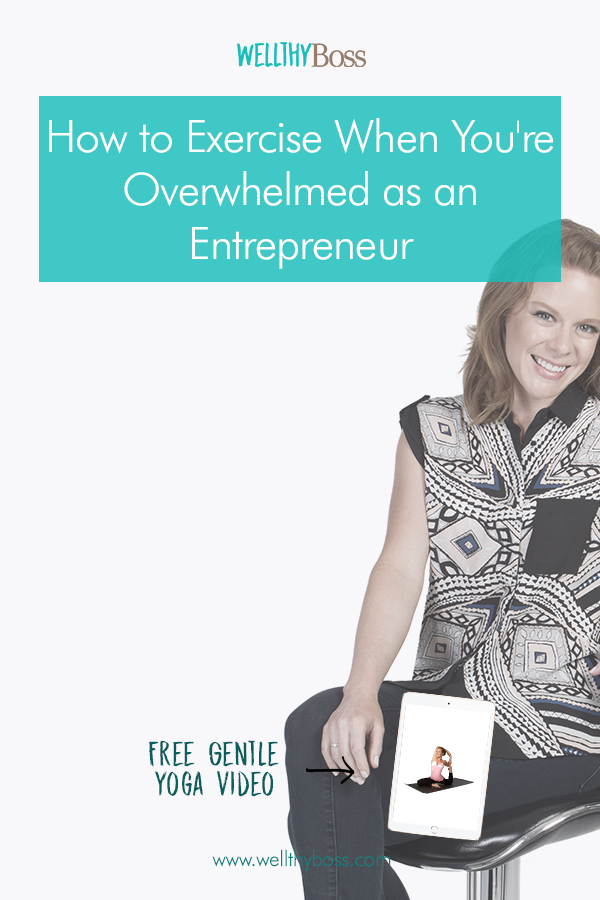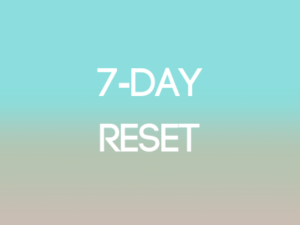
You’d be hard-pressed to find a friend or fellow entrepreneur these days that doesn’t describe themselves, in some capacity, as either busy or stressed. And that stress can serve as either a catalyst OR as a hurdle for our workouts. Stress and exercise have a symbiotic relationship.
On the one hand, there’s definitely that handful of people who experience a better workout when they’re incited by anger or riding an adrenaline rush from a recent conflict—feeling pissed off can give you energy to burn! But this type of exercise muse tends to be episodic in nature—a righteous anger that seeks a remedy.

Chronic stress, however, can have the opposite effect. If what you’re facing is more than the garden variety of stress and job pressures, it’s likely that exercise is the last thing you want to do.
In fact, research shows that Millenials are more likely to skip a workout when stressed, even though 53% of them say being physically fit is very important to them and are more likely than other generations to notice an improvement in mood after exercise. (Source: American Psychological Association)
I know you expect a pep talk here: Exercise will help you manage stress. You’ll feel better afterward. The research shows it. Blah blah blah. And, yes, I do believe that. It’s commonly held among psychologists that thirty minutes of exercise three times a week can be as effective at managing stress and anxiety as a pill.
But I also know that there’s a whole lot more going on under the hood when you’re dealing with substantial overwhelm. By substantial overwhelm, I mean experiencing chronically high stress levels, a major life change or series of life changes, grief, trauma–OR the perpetual stress of running a start-up!
And while I’m not going to give you a hall pass during these times to forego exercise and camp out on the couch with the shades drawn, you need to understand the physical and chemical processes that take place when you’re under mental or emotional duress and how exercise interacts with those processes. Once you understand what’s going on in your body, you’ll have a much better feel for how to exercise when you’re overwhelmed.

First off, we tend to use the word “stress” to describe either our circumstances or emotions (or both). But the body perceives stress as anything that taxes its resources, essentially. So stressors can range the gamut from things like that project deadline and your kids’ competing sports schedules on the one hand, to more physical stressors like poor air quality, sleep deprivation, chemical exposure in your cleaning products and cosmetics, etc.
Psychologist Richard Lazarus defines stress as “any event in which environmental demands, internal demands, or both tax or exceed the adaptive resources of an individual, social system, or tissue system.” (Source: IdeaFit.com)
And guess what else, strictly speaking, is considered a stressor? Exercise. Yep, really. So are you darned if you do and darned if you don’t?
Here’s the deal. Not all stress is bad. A little stress keeps us primed for action. But when we have too much of it, our bodies start to break down.
When the body is stressed, either from psychological stress or extreme exercise, proteins known as cytokines start to elevate dramatically. These proteins are responsible in part for our immune system, thus causing an inflammatory response in the body. (Neiman, et al. 2004, Schwartz 2004)
What does this mean for you on a practical, day-to-day basis? Well, if you are feeling the weight of the world (or your business) on your shoulders, your usual 3-mile run may just feel like a marathon. And if you try to push through at your normal pace, berating yourself for sucking at running as well as sucking at whatever caused you stress in the first place, you could just be exacerbating the body’s response to stress. 
The body’s VO2 max (rate at which oxygen is consumed) is hindered when an individual is under high emotional stress, so that ordinary activity not only seems harder, but actually is. (Source: Huffington Post)

Dr. Mercola of Peak Fitness says this: “Physical and mental fatigue affect the same region of your brain—the anterior cingulate cortex—so if you are mentally fatigued, you’ll likely be physically fatigued as well.” (Source: Peak Fitness)
Studies also show that athletes that have lower levels of social support and coping skills are much more likely to get injured than those who have more support. (Smith, Smoll, & Ptacek, 1990)
Wowzers! I know that’s a lot of data I just threw at you, but when we’re emotionally or mentally off our game, I think it’s important to understand what’s going on physically so that we can be a little kinder to ourselves.
But all that being said, the appropriate level of exercise intensity can still, of course, be the magic bullet to keeping our frazzled brains intact and increasing our ability to cope and look for creative solutions.
I can speak to this from a place of very recent personal experience. My husband and I have had a series of major decisions, setbacks, and changes over the past several months, and I often feel those changes physically. Not feeling like you have control over the circumstances around you can really be debilitating.
I think one of my wisest choices through all this stress is to have adjusted the intensity of my workouts accordingly. Can it be a little frustrating for a fitness professional to have to dial way back? Um, yes! I ran a full marathon (complete with long hilly stretches) less than a year ago, and this spring I’ve often had to trade out a run for a long walk instead.

But those walks proved to be just the very thing I needed. I felt calmer afterwards, happier, and not depleted afterwards the way an endurance run might have left me.
So do yourself a kindness when times are tough: Continue that oh-so-important ritual of exercising, but listen to your body and make your workout match your mental state. You’ll be back to your confident, healthy, happy self in no time!
Need a fall-back option for when you’re not up to a killer workout? My FREE Gentle Yoga Video is just the thing! It’s 15 minutes of a gentle guided practice to help you chill your mind while restoring your body.




